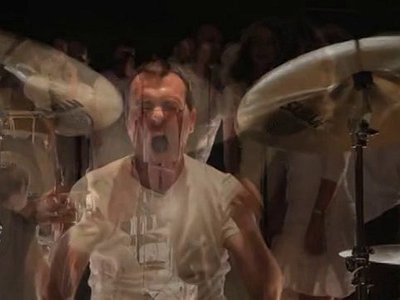Part 2
How strictly do you separate improvising and composing?
Both are really important to me. I generally create a framework that not only contains improvisation within it but also depends on it in order to make the piece more alive. So, they aren’t separate for me at all, but two things that work in conjunction.
How do you see the relationship between sound, space and composition and what are some of your strategies and approaches of working with them?
In a lot of my work, space progressively gets removed and as sounds begin joining together, new, unknown sounds can form from those combinations. That occurrence is largely based on chance, but it is something I aim toward. I like when music can appear that all the ideas weren’t mine and that things that occur within it weren’t my doing.
What's your perspective on the relationship between music and other forms of art – painting, video art and cinema, for example – and for you and your work, how does music relate to other senses than hearing alone?
In recent years, I began seeing percussion and drumming as a sort of dance and that anything musical comes out of the action of this dance. Which then questions how to dance, why dance and what does dance even mean?
What's your view on the role and function of music as well as the (e.g. political/social/creative) tasks of artists today - and how do you try to meet these goals in your work?
I think that music can be a powerful support to an idea as it can contain emotional and psychological triggers. But that should not undermine the inherent quality of music itself, and it should not be used lightly.
Listening is also an active, rather than just a passive process. How do you see the role of the listener in the musical communication process?
When I was young in school, I could sometimes sit through an entire class, thinking of many things besides what the teacher was saying. In some ways, it was almost like hypnosis, where I was physically present in one situation, but mentally in another. The elements of the classroom – the teacher’s voice, the content, the surroundings, brought me mentally to a place completely different than what was intended. That experience is possible with music, too. Music can function as an introduction to conversations within you that might not have happened otherwise.
Reaching audiences usually involves reaching out to the press and possibly working with a PR company. What's your perspective on the promo system? In which way do music journalism and PR companies change the way music is perceived by the public?
Of course, it’s helpful if one’s work is covered in the media. However, critical approval doesn’t necessarily sell music or raise one’s status. The aim should be to provide quality work to those interested, including media contacts.
Sometimes, press coverage of things we’re not interested in can seem ubiquitous, and that can make us wonder why we don’t get more attention for our work. This is not the fault of journalism. I would advise focusing not on what others are doing, but our own ideas and relationships with those interested in our work. How the public perceives things is beyond our control, but our creativity isn’t.
Do you have a musical vision that you haven't been able to realise for technical or financial reasons – or an idea of what music itself could be beyond its current form?
Not really, but that’s not how I think. Any idea I’ve had, even a technically or financially expensive one, I’ve figured out a way to accomplish. I think if I thought about things that were too grand to accomplish, I’d be very frustrated or bitter and it would impact the work negatively. I’m much more interested in working at just the outer edge of limitations, and seeing how to accomplish a bit more than what I expected was possible – but not too much.






